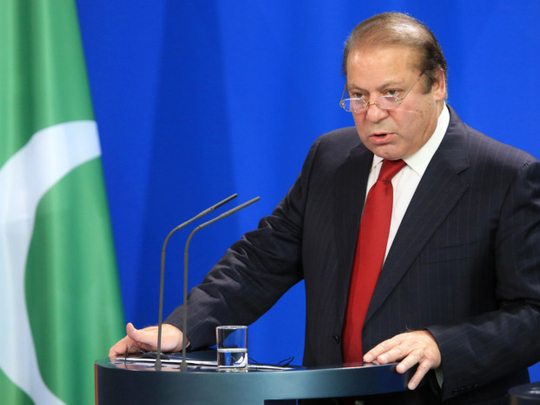
Pakistan’s Interior Minister Chaudhary Nisar Ali Khan reportedly lost his cool on Thursday when he unleashed an unusual warning to senior officials of a top law enforcement agency. In a meeting with key figures from the Federal Investigation Agency (FIA), Pakistan’s main crime investigation unit, Khan threatened to shut down the outfit unless investigations in cases of corruption are expedited.
As Pakistan remains surrounded by an all too audible buzz over corruption, Khan’s anxiety is understandable. As one of the more credible politicians from the country’s ruling structure, Khan’s words cannot be taken lightly. And yet, expediting progress on this all-too-difficult issue is easier said than done.
The issue of corruption has systematically grown in Pakistan over the years under successive governments. Consequently, inappropriate behaviour by the top elite, which was once totally frowned upon, is now considered relatively kosher.
Meanwhile, the damage to Pakistan’s body fabric from rampantly growing corruption continues to deeply undermine the country’s future in ways not seen before. The country’s economic outlook has been damaged beyond repair as prospective investors remain on the sidelines in South Asia’s second-largest economy, in large measure due to the prevalence of corrupt practices. Yet, the matter of corruption is so substantial that its resolution remains well beyond the scope of any one government agency such as the FIA.
Unusual silence
Indeed, Pakistan’s mainstream political parties such as Prime Minister Nawaz Sharif’s Pakistan Muslim League–Nawaz (PML-N) or former president Asif Ali Zardari’s Pakistan Peoples Party (PPP) have chosen to delay a long overdue attack on corruption. It is therefore hardly surprising that any push to vigorously end corrupt practices almost never figures in parliamentary discussions on matters related to reforming Pakistan.
Notwithstanding Khan’s words, a meaningful attack on corruption requires Pakistan’s leaders to finally wake up to the way the country’s prospects have been destroyed as corrupt practices have made deeper inroads. Unless Pakistan’s top leaders begin with not only formulating new anti-corruption laws but also enforcing them, comprehensive change will just not come. As for evidence of the widespread occurrence of corrupt practices, it exists all across Pakistan. For any ordinary citizen across the country, life without at least being exposed to someone else being wrapped in a corruption-related matter now hardly qualifies as a novelty. It’s an experience that has become all too routine.
Given that Khan stepped into the fray, he must now be counted among those with a responsibility to push ahead with a detailed discussion of the issue, followed by agreement on a clear path to resolving the matter. To begin with, there needs to be a consensus among the ruling politicians and the opposition over the key areas that need to be immediately targeted.
Parallel economy
For too long, Pakistan’s rulers have ignored matters such as the expansive black economy and the need to push ahead with genuine tax reforms of the kind never seen before. Almost 99 per cent of Pakistan’s population does not pay income tax, leaving behind a big black hole in the economy.
While a large chunk of such Pakistanis may legitimately be too impoverished to figure in tax collections, there is an equally large chunk who are relatively well endowed but go scot free. The matter of reforming tax collection nevertheless falls on deaf ears when seen within the context of Pakistan’s political realities. The parliament in Islamabad and representative legislatures in the provincial capitals are dominated by influential landowners who remain exempt by law from paying income tax. This is a big anomaly that needs to be tackled immediately, in favour of removing a key gap. Ultimately, as long as influential individuals remain exempt from paying their dues, its impossible to check their use of funds for legitimate or illegitimate purposes.
The story of Pakistan’s corrupt practices is indeed all too visible outside the political spectrum too. Across the country, many influential businessmen also remain practically exempt from paying their dues. While not exempt from paying taxes, such business figures have conveniently made it their business to team up with corrupt tax officials and end up paying taxes that are far below their legitimate dues.
Far removed from reality
As Khan seeks to corner the FIA, the evidence of corruption par excellence is found right at the centre of Islamabad, the Pakistani capital. Shop after shop in the upper class blue area commercial centre is stocked with expensive merchandise, presenting a picture that is far removed from the reality of a country which in part is stricken with abject poverty. And yet, seldom has there been an effort to minutely track the customers of these outfits as a way to track down their sources of income.
While much has been done over promises of seeking to attack corruption, little progress has been made in reality. In recent weeks, Pakistan’s business circles have been surrounded by mounting speculation over the tightening of a so-called anti-corruption regime when Pakistan’s new budget is presented in June this year.
The danger, however, is that the set of choices for the next financial year, which begins in July, will only seek to target those in the 1 per cent of Pakistan’s population who pay an income tax.
Going forward, Khan’s words are in danger of becoming confined once again to the dustbin of history unless followed by vigorous and long overdue action. Pakistan of course needs to battle hard against corruption. But are the country’s ruling elite ready to embrace that cause? To that pertinent question, the answer unfortunately must be in the non-affirmative.
Credit: Farhan Bokhari is a Pakistan-based commentator who writes on political and economic matters.








